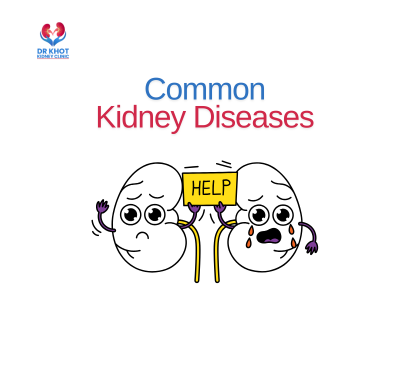The kidneys play a crucial role in maintaining overall health by filtering waste, balancing fluids, regulating blood pressure, and producing essential hormones. However, various conditions can affect their function, leading to kidney diseases that, if left untreated, can become severe or even life-threatening.
This article will explore:
✔ Common kidney diseases and their causes
✔ Key symptoms to watch for
✔ When to consult a nephrologist
✔ Treatment and prevention tips
Understanding Kidney Diseases
Kidney diseases can range from mild infections to chronic kidney failure requiring dialysis or transplantation. The most common kidney-related conditions include:
1. Chronic Kidney Disease (CKD)
Chronic Kidney Disease (CKD) is a gradual loss of kidney function over time. It affects millions of people worldwide and can lead to kidney failure if not managed properly.
Causes of CKD:
✔ Diabetes – High blood sugar damages kidney filters.
✔ Hypertension (High Blood Pressure) – Increases pressure on kidney tissues.
✔ Glomerulonephritis – Inflammation of kidney filters.
✔ Polycystic Kidney Disease (PKD) – A genetic disorder causing fluid-filled cysts in kidneys.
✔ Repeated kidney infections – Can cause long-term damage.
Symptoms of CKD:
✔ Fatigue and weakness
✔ Swelling in the legs and ankles
✔ Frequent urination, especially at night
✔ Blood in urine or foamy urine
✔ Persistent nausea or vomiting
✔ Loss of appetite
🔔 When to See a Nephrologist:
If you have diabetes, hypertension, or a family history of kidney disease, consult a nephrologist for early screening.
2. Kidney Stones
Kidney stones are hard deposits of minerals and salts that form inside the kidneys and can cause intense pain when passing through the urinary tract.
Causes of Kidney Stones:
✔ Dehydration – Lack of water leads to concentrated urine, forming stones.
✔ High salt and protein diet – Increases stone-forming substances.
✔ Obesity – Increases the risk of kidney stones.
✔ Certain medications – Such as calcium-based antacids and diuretics.
Symptoms of Kidney Stones:
✔ Sharp pain in the lower back and side
✔ Painful urination
✔ Blood in urine
✔ Nausea and vomiting
✔ Frequent urge to urinate
🔔 When to See a Nephrologist:
If kidney stones recur frequently or cause severe pain and infections, a nephrologist may recommend lithotripsy (shock wave therapy) or surgical removal.
3. Urinary Tract Infections (UTIs) Leading to Kidney Infections
A Urinary Tract Infection (UTI) can spread to the kidneys, leading to a serious condition known as pyelonephritis.
Causes of Kidney Infections:
✔ Untreated UTIs
✔ Kidney stones causing blockage
✔ Weakened immune system
✔ Enlarged prostate in men (leading to incomplete bladder emptying)
Symptoms of Kidney Infections:
✔ High fever and chills
✔ Pain in the lower back or side
✔ Burning sensation while urinating
✔ Cloudy or foul-smelling urine
✔ Nausea and vomiting
🔔 When to See a Nephrologist:
If you experience frequent UTIs, blood in urine, or severe lower back pain, a nephrologist may recommend a kidney function test to check for underlying issues.
4. Acute Kidney Injury (AKI)
Acute Kidney Injury is a sudden loss of kidney function due to illness, infection, or medication toxicity.
Causes of AKI:
✔ Severe infections (sepsis)
✔ Dehydration
✔ Certain medications (NSAIDs, antibiotics, contrast dyes)
✔ Obstruction (kidney stones or enlarged prostate)
Symptoms of AKI:
✔ Sudden decrease in urine output
✔ Swelling in legs and face
✔ Shortness of breath
✔ Confusion or drowsiness
🔔 When to See a Nephrologist:
If you stop urinating or develop severe swelling, seek immediate medical attention. AKI requires hospitalization and intensive treatment.
5. Polycystic Kidney Disease (PKD)
Polycystic Kidney Disease is a genetic disorder where multiple cysts grow inside the kidneys, affecting their function.
Causes of PKD:
✔ Inherited genetic mutation (autosomal dominant PKD)
Symptoms of PKD:
✔ High blood pressure
✔ Frequent kidney infections
✔ Blood in urine
✔ Pain in the back or sides
🔔 When to See a Nephrologist:
Since PKD is a progressive condition, regular check-ups and lifestyle modifications are crucial.
Diagnosis of Kidney Diseases
To diagnose kidney diseases, a nephrologist may recommend:
✔ Urine Test (Urinalysis) – Detects infections, protein, or blood in urine.
✔ Blood Test (Creatinine & eGFR) – Measures kidney function.
✔ Ultrasound or CT Scan – Identifies structural issues like cysts or stones.
✔ Kidney Biopsy – Helps diagnose glomerulonephritis and chronic diseases.
Treatment Options for Kidney Diseases
1. Medications
✔ Blood Pressure Medicines (ACE inhibitors, ARBs) – Protect kidneys in CKD.
✔ Antibiotics – Treat kidney infections.
✔ Pain Relievers – For kidney stones (avoid NSAIDs if kidney disease is present).
2. Lifestyle Changes
✔ Drink plenty of water to prevent kidney stones.
✔ Follow a low-sodium, kidney-friendly diet.
✔ Manage diabetes and blood pressure.
✔ Avoid smoking and excessive alcohol consumption.
3. Dialysis or Kidney Transplant (For CKD Stage 5)
✔ Dialysis removes waste from the blood when kidneys fail.
✔ Kidney transplant is recommended for end-stage kidney failure.
Kidney diseases are silent killers that often show symptoms only in advanced stages. Early detection, lifestyle modifications, and regular medical check-ups can prevent severe complications.
If you have risk factors like diabetes, high blood pressure, or recurrent UTIs, consult a nephrologist to assess your
FAQ
1. Can kidney disease be cured?
✔ Chronic kidney disease cannot be reversed, but early detection and lifestyle changes can slow its progression.
2. What are the early warning signs of kidney disease?
✔ Fatigue, swelling, foamy urine, and frequent urination at night are early symptoms.
3. How can I protect my kidneys naturally?
✔ Drink enough water, control sugar and salt intake, and avoid overuse of painkillers.
kidney health. Your kidneys work hard for you—take care of them before it’s too late!

